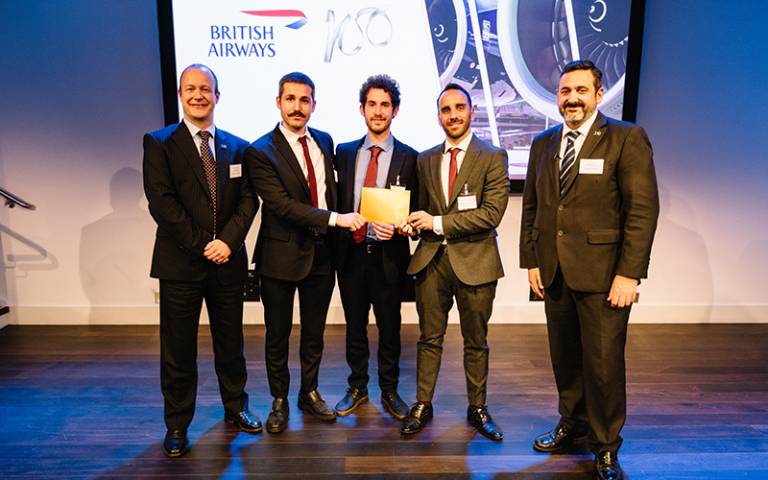UCL Waste-to-Fuel technology selected for pioneering airlines future sustainable fuels
8 May 2019
UCL Chemical Engineering wins 1st prize in the British Airways Sustainable Aviation Fuels Academic Challenge to develop an aviation fuel of the future and will receive a £25,000 prize and commitment from major airlines to help develop the solution further.

UCL Chemical Engineering Waste-to-Fuel technology has been selected by leading airline company British Airways, as the preferred sustainable solution to support its project to develop a new or different pathway to achieve global leadership in the development of sustainable aviation fuels. The airline posed the question of how to power a long-haul flight for at least five hours and produce zero CO2 emissions.
A young UCL team that included Fabio Grimaldi (PhD student), Stefano Iannello (PhD student), Alex Sebastiani (UCL seconded MSc student from University of L'Aquila) and lead by Dr. Massimiliano Materazzi (RAEng Research Fellow), proposed a solution that would turn household waste into jet fuel, building plants to convert the waste near landfill sites across the country. The team estimates that this could deliver 3.5 million tonnes of jet fuel annually by 2050, resulting in negative emissions and the equivalent of supplying over 1/3 of the entire UK aviation fuel demand.
UCL’s WWW (waste-wind-wing) process is a clean, modular and scalable advanced waste to fuels technology which delivers high efficiencies whilst minimising visual and environmental impact. The process converts residual waste into low carbon bio-substitute jet fuel using a combination of existing cutting-edge technologies. The feedstock is Refuse derived fuel (RDF), which is produced from mixed household “black bag” waste, after all recyclable materials (e.f. glass, PET plastics, etc.) are removed.
Dr. Materazzi and his team are currently testing the system at lab scale, with the aim of building a pilot plant within the second half of 2020. Once complete, the project could move to a larger scale and contribute to reducing carbon emissions and providing fuel from a local, abundant feedstock that would be otherwise sent to landfills.
Massimiliano Materazzi, Project developer and Team leader, said:
“We are delighted that our innovative process has been selected by the panel and look forward to continuing our work with BA in helping realise this exciting and pioneering project. We know that BA is already working on other Waste-to-Fuels project, but we believe that more alternatives would help diverting more waste from landfills and produce significant volumes of sustainable fuels.
The UK has seriously committed to be a world leader in low carbon aviation. Government funding, recent policy changes and initiatives like this from big airlines will play a key role in decarbonising the aviation sector, which still lacks of green alternatives.
 Close
Close

